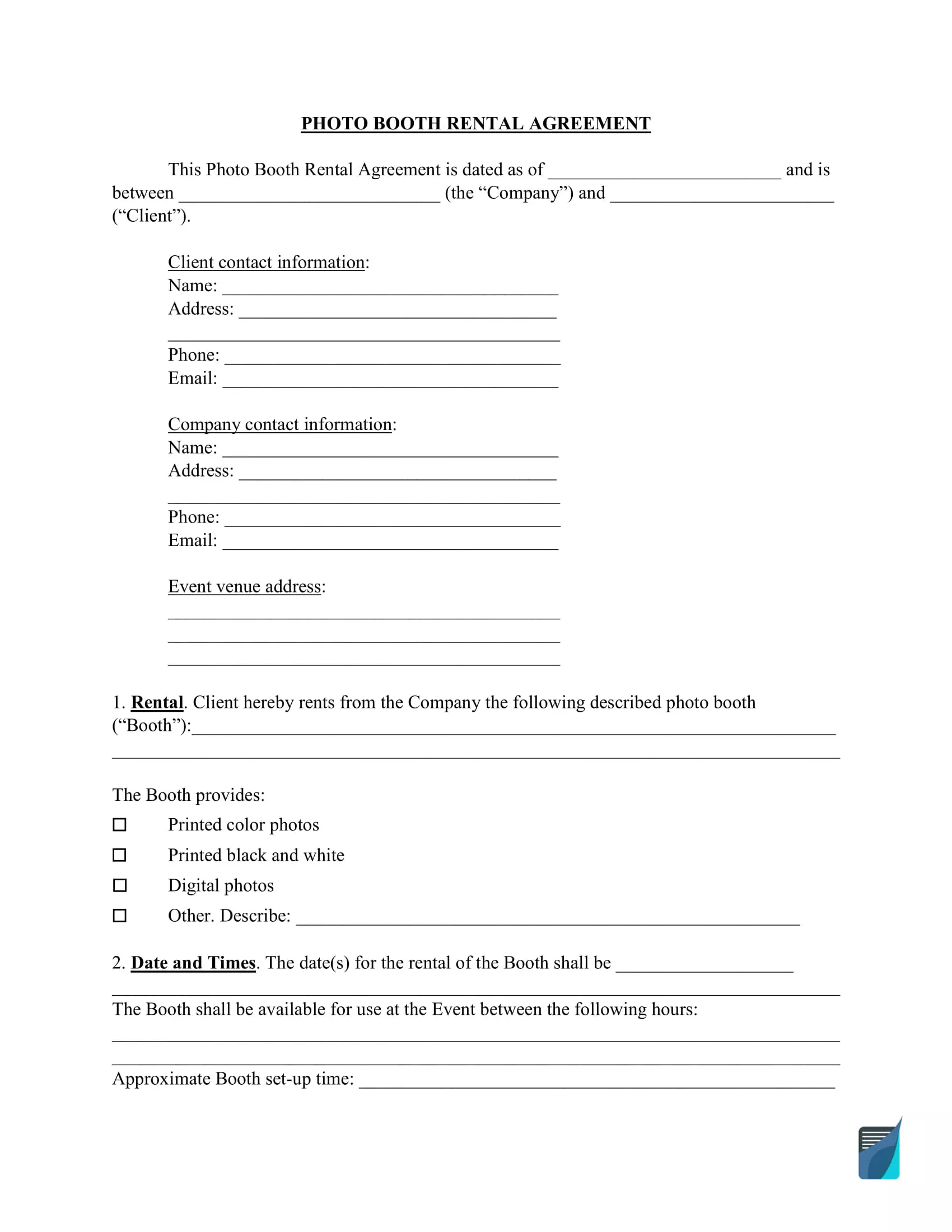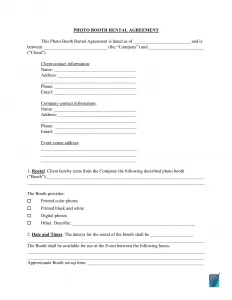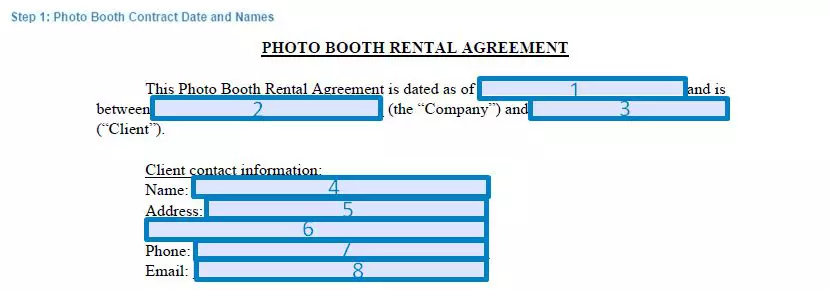Photo Booth Contract Template
Photo booth contracts are the rental agreement between a person or company renting a photo booth, and the booth’s owner. They are important for event runners who want to offer a photo booth for their events, and can also be used by venues to create an agreement for a long-term rental of the booth.
Having a good rental helps make sure everyone gets what they agreed on, that all rent and fee payments are made, and that the photo booth meets the qualifications of the renter.
A photo booth contract can be used for almost any kind of photo booth, from large designs that can fit whole groups of people in together to smaller portable versions that aren’t much more than a camera and photo printer system.

Build Your Document
Answer a few simple questions to make your document in minutes
Save and Print
Save progress and finish on any device, download and print anytime
Sign and Use
Your valid, lawyer-approved document is ready
What’s Included in the Rent?
Photo booth rental can vary a lot from company to company and booth to booth. Since every booth is a little different you should read the terms of your rental agreement carefully to make sure you’re getting what you want. At a minimum, you should expect that a photo booth rental will include the camera, film for printing at least one kind of photo, along with the ink for that photo.
You may also get a box of props along with your booth rental, though that may come with an additional charge. Depending on the kind of photo booth you are renting you may also get instruction on how to use the booth as a standard part of your contract. There is a section in the commercial lease template that will tell you if the instruction is included.
Traditional Photo Booth vs. DIY Photo Booths
Traditional photo booths can have a lot of advantages, but the truth is that as technology improves there’s less and less need for professional photo booths. Most people have smartphones and other personal devices with cameras more than up to the job of taking high-quality photos at events.
So what do you get with a photo booth? For one thing, there’s something enticing about photo booths that you don’t get with regular photos. You can recreate it somewhat if you have a photo area with props and a backdrop, but a professional photo booth is a treat above that. DIY photo booths might not be quite as special, but they can be much more affordable.
What Should Be Included in the Contract?
There are a few things that should be included in all photo booth agreements. Here are the basics:
- Rental amount and due dates
- Any security deposits or fees
- Included equipment
- Type of photos printed
- Late fees
Props and any other details about the rental should be included but may come with an additional cost above the rental. You’ll also need to include some event details so the rental company knows what to expect.
- What kind of event
- Date, time, and location
Photo Booth Contract Form Details
| Document Name | Photo Booth Contract Form |
| Other Name | Photo Booth Rental Agreement |
| Avg. Time to Fill Out | 12 minutes |
| # of Fillable Fields | 54 |
| Available Formats | Adobe PDF |

Filling Out a Photo Booth Contract
Step 1: Date, Company Name, Client Name
The first thing you need to do to rent a booth contract is to fill out the date of the rental. You’ll also need to list the name of the company you’re renting from, and the names of everyone they are renting to. You’ll also include contact information for everyone involved, usually emails and phone numbers.

Step 2: Rental Details and Delivery
In your photo booth rental agreement you’ll also need to include details about the photo booth and the kind of photos being provided. The rental company will describe the booth, a list of the kind of photos it will print, and anything extra that comes with the booth rental. This section should also include details about when and where the booth will be set up, and approximately the time setup will begin. Our photo booth contract template also specifies what kind of event the booth will be used for, and it’s important to list the event type accurately. The last details in this section are about booth delivery and pickup. This section will also detail whether the rental client will get a demonstration from the owner or whether the booth will be entirely self-serve.

Step 3: Fees and Indemnity Clause
As with any booth rental, there are some possible fees if the booth is damaged or any other terms of the contract are violated during the rental. This section also includes any security deposits that are required, the exact amount of the rental, and when the rent is due for the booth. You may be able to make multiple payments, in which case this section will include the deadline for every payment on the booth. If you keep the booth at your event longer than planned, there will likely also be a fee. Time overage fees increase as time goes on, so both the amount of the fee and how long it covers are included in the contract.

Step 4: Props Included
Often photo booths will come with some photo props to make taking photos more fun and entertaining. If your booth rental comes with any props they will be listed in this section, along with the cost of the rental. Most companies will offer a standard ‘prop box’ instead of listing individual items, but they’ll also provide a list of items with the box to make sure everything is returned. Additional fees may apply if any of the props are broken or lost.

Step 5: Date Change and Fees, Photo Release, and Other Additional Provisions
Changing when you are renting your photo booth can cause problems for the rental company, so it’s standard to include a fee in case the rental time or day needs to be changed after the contract is signed. The company sets this fee, and the exact amount will be included here. Most photo booth rental companies also retain copyright rights to all the photos taken in their booth. This section indicates that the booth rental company has the right to print and reproduce photos taken in their booth, without paying royalties. The additional provisions section allows for the client (or renter) to get some of the cost of the rental back if the booth doesn’t work for a certain percentage of their event. If either party wants to add any additional conditions or rules to the contract, this is where it will appear.

Step 6: Signatures
Assuming you agree to all the terms of your photo booth rental contract, the last step is for everyone to sign and date the contract. Most of the time you won’t need to get this kind of contract notarized, but some companies may ask for notarization or a witness. Witnesses are usually provided by the company if they are required.

